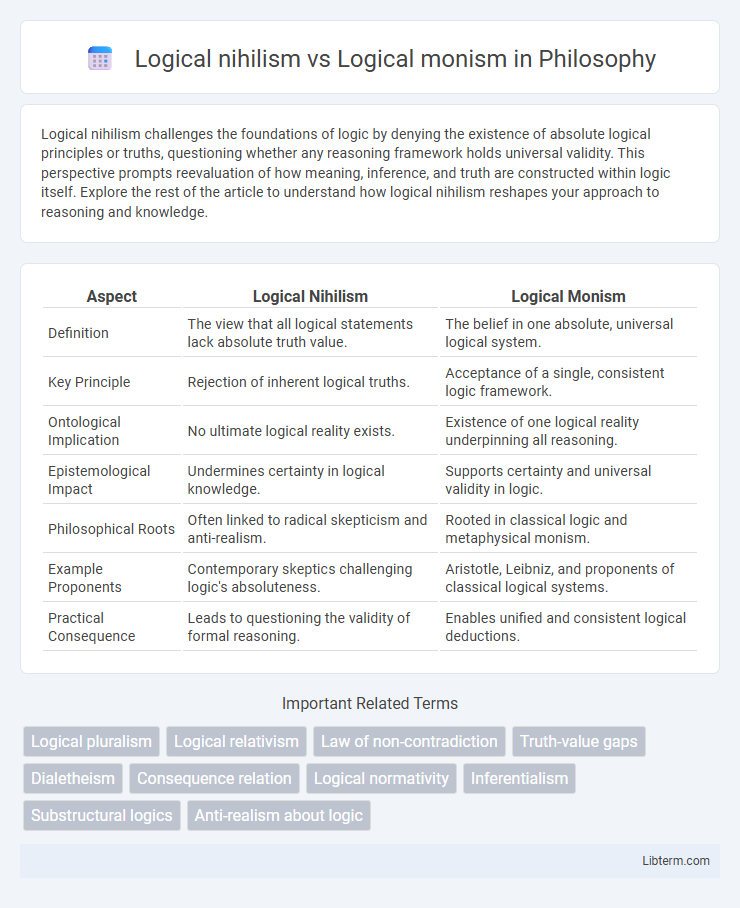Logical nihilism challenges the foundations of logic by denying the existence of absolute logical principles or truths, questioning whether any reasoning framework holds universal validity. This perspective prompts reevaluation of how meaning, inference, and truth are constructed within logic itself. Explore the rest of the article to understand how logical nihilism reshapes your approach to reasoning and knowledge.
Table of Comparison
| Aspect | Logical Nihilism | Logical Monism |
|---|---|---|
| Definition | The view that all logical statements lack absolute truth value. | The belief in one absolute, universal logical system. |
| Key Principle | Rejection of inherent logical truths. | Acceptance of a single, consistent logic framework. |
| Ontological Implication | No ultimate logical reality exists. | Existence of one logical reality underpinning all reasoning. |
| Epistemological Impact | Undermines certainty in logical knowledge. | Supports certainty and universal validity in logic. |
| Philosophical Roots | Often linked to radical skepticism and anti-realism. | Rooted in classical logic and metaphysical monism. |
| Example Proponents | Contemporary skeptics challenging logic's absoluteness. | Aristotle, Leibniz, and proponents of classical logical systems. |
| Practical Consequence | Leads to questioning the validity of formal reasoning. | Enables unified and consistent logical deductions. |
Introduction to Logical Nihilism and Logical Monism
Logical nihilism rejects the existence of absolute logical truths, asserting that logic lacks inherent validity and that no statement can be deemed universally true or false. Logical monism, in contrast, maintains that there is a single, consistent logical system governing truth and reasoning, with all logical statements being evaluated within this unified framework. These opposing views highlight fundamental debates in the philosophy of logic regarding the nature and scope of logical laws and their applicability.
Defining Logical Nihilism
Logical nihilism asserts that no logical system holds absolute truth, rejecting all logical frameworks as inherently flawed or insufficient. It contrasts with logical monism, which claims a single, definitive logical system underpins all rational thought and valid reasoning. By denying universal logical validity, logical nihilism challenges the foundation of consistent truth and objective inference in philosophy and mathematics.
Outlining Logical Monism
Logical monism asserts a single, unified logical framework underpins rational discourse and reasoning, positing that all valid inferences conform to one universal system such as classical logic. This view contrasts sharply with logical nihilism, which denies the existence of any definitive logical structure, claiming that logical systems lack objective grounding or absolute authority. Logical monism supports consistency and coherence in argumentation by advocating a standardized logical foundation that facilitates clear communication and effective problem-solving across diverse contexts.
Historical Development of Logical Theories
Logical nihilism, emerging in the 20th century, critiques the possibility of establishing any absolute logical truths, challenging foundational assumptions within classical logic. Logical monism, rooted in Aristotelian tradition and furthered by Frege and Russell, asserts the existence of a single, universal logical system governing reasoning processes. The historical development of these theories reflects philosophical tensions between rejecting all logical absolutes and defending a unified logical framework essential for coherent discourse and formal reasoning.
Philosophical Foundations of Logical Nihilism
Logical nihilism challenges the existence of absolute logical truths, asserting that logic lacks objective validity or intrinsic necessity. Rooted in radical skepticism and anti-foundationalism, it denies the universality of logical laws, contrasting sharply with logical monism's commitment to a single, unified logical framework. Philosophical foundations of logical nihilism draw from dialectical critique of metaphysical absolutes and emphasize the contingency and context-dependence of logical systems.
Core Principles of Logical Monism
Logical monism asserts that there is a single, unified logical system that underpins all rational discourse and thought, emphasizing the universality and consistency of logic. Core principles of logical monism include the belief in absolute logical laws that apply universally, the rejection of competing or multiple valid logical frameworks, and the commitment to a singular structure of inference and truth conditions. This contrasts sharply with logical nihilism, which denies the existence of any definitive logical system, challenging the possibility of universal logical truths.
Key Differences Between Logical Nihilism and Monism
Logical nihilism rejects the existence of any absolute logical truths, denying that universal logical principles can be inherently valid. In contrast, logical monism asserts that a single, unified logical system underpins all rational thought and reasoning. The key difference lies in nihilism's skepticism about any definitive logic versus monism's commitment to the supremacy of one consistent logical framework.
Implications for Philosophical Logic
Logical nihilism, which rejects the existence of any definitive logical truths, challenges the foundation of classical logical systems by questioning the applicability of universal logical laws. Logical monism asserts a single, coherent logical framework as the exclusive basis for reasoning, reinforcing the consistency and objectivity within philosophical logic. The tension between these positions influences debates on the nature of truth, the validity of inference rules, and the scope of logical relativism in epistemology.
Contemporary Debates and Critiques
Contemporary debates in logical nihilism challenge the existence of any fundamental logical truths, arguing that all logical systems are arbitrary and context-dependent, which contrasts sharply with logical monism's assertion of a single, universal logic governing valid reasoning. Critics of logical nihilism highlight the practical necessity of consistent logical frameworks for communication and scientific inquiry, while advocates emphasize the diversity of logical systems like classical, intuitionistic, and paraconsistent logics in reflecting different modes of reasoning. These debates deepen the philosophical understanding of logic's role, questioning whether logic is discovered as a universal truth or constructed as a flexible tool shaped by linguistic and conceptual frameworks.
Conclusion: The Future of Logical Theories
Logical nihilism rejects the existence of universally valid logical principles, challenging the foundation of traditional reasoning frameworks and suggesting a pluralistic or fragmented approach to logic. Logical monism asserts that a single, universally valid logical system underpins all reasoning, providing coherence and consistency across diverse domains. The future of logical theories likely involves exploring hybrid models that integrate insights from both perspectives to accommodate context-sensitive reasoning and maintain rigorous standards of validity.
Logical nihilism Infographic

 libterm.com
libterm.com